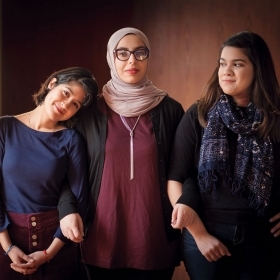Stronger together. We’ve heard that phrase a lot in the past year. For some of you, it’s a slogan that resonates sadly now. Others may have been more focused on making America great again or feeling the Bern, and those two words don’t call up quite as much.
But to the degree possible, let’s step aside from the political and talk about what “stronger together” means for our community. It means that when a student needs emergency dental work, she can get a loan from Wellesley Students’ Aid Society, thanks to funds provided by alumnae who graduated decades before she was born. It means when an alum leaves an iPad on a plane, she can put out “the Wellesley bat signal” online and another alum in a different state can rescue it for her. It can lead to career referrals, a place to stay in a new city, and support when a spouse dies.
In the last few months, “stronger together” has been very evident on campus. As you may know, a truck bearing a large Trump flag came through campus the day after the election and ended up at Harambee House, before circling back. Students felt outrage, fear, and a whole range of other emotions—as many were trying to make sense of what they saw as a new political order.
In the weeks that followed, “stronger together” meant hundreds of students, faculty, and staff showing up on the spur of the moment for a “peace walk.” Led by President Paula Johnson, the long line wound around campus and concluded at the lake with words of encouragement. “Stronger together” meant professors sharing their expertise at post-election teach-ins; Wellesley Alumnae of African Descent reaching out to black students; and alumnae clubs sending gifts when Acorns, the College’s new multicultural space, opened this semester.
This issue wouldn’t have happened without a group of talented, generous alumnae journalists working “stronger together.” Our winter cover story—which had been carefully calibrated to stand up whatever happened with the election—crashed and burned on Nov. 9, only three weeks before our copy deadline. Amita Parashar Kelly ’06, Amy Mayer ’94, and Liz Johnson ’01 agreed to split up the reporting on a new article—about the march toward gender parity in the political arena (“Women Who Run” ).
A couple weeks later, Amita, the lead writer, emailed me at 3:48 a.m. on the way to the hospital for the early delivery of her baby son. She had the presence of mind to send the partly written article and all the interview notes. Amy—who works full-time for Iowa Public Radio—stepped in and finished it by deadline. A doff of the hat to this trio for grace under pressure.
We also owe a debt of gratitude to Yolette García ’77, another journalist with a day job. When it became clear that we needed to develop a second new feature on post-election campus events stat, she gulped and dove into reporting from Dallas, aided by the magazine staff. “After the Election” on page 28 is the result. And praises to Jennifer Vanasco ’94, who delivered her fascinating article on women’s voices (“Raising Our Voices”), on time and in little need of edits. A terrific piece of reporting.
Why am I telling you all of this? Only to point out that what I see in our wider community gives me great hope. I see people, though sometimes stretched almost to breaking, going further and doing more. I see wit, and intelligence, and the ability to seek out facts and analyze them. I see empathy for those who are marginalized or in need—and a desire to take action to help. I see generosity and camaraderie. I see that we are stronger together.








We ask that those who engage in Wellesley magazine's online community act with honesty, integrity, and respect. (Remember the honor code, alums?) We reserve the right to remove comments by impersonators or comments that are not civil and relevant to the subject at hand. By posting here, you are permitting Wellesley magazine to edit and republish your comment in all media. Please remember that all posts are public.